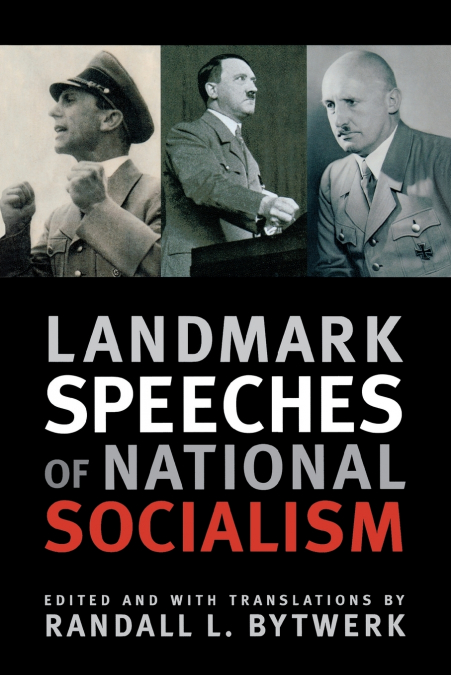
 Librería Perelló (Valencia)
Librería Perelló (Valencia)
 Librería Aciertas (Toledo)
Librería Aciertas (Toledo)
 El AlmaZen del Alquimista (Sevilla)
El AlmaZen del Alquimista (Sevilla)
 Librería Elías (Asturias)
Librería Elías (Asturias)
 Librería Kolima (Madrid)
Librería Kolima (Madrid)
 Donde los libros
Donde los libros
 Librería Proteo (Málaga)
Librería Proteo (Málaga)
"The power which has always started the greatest religious and political avalanches in history rolling has from time immemorial been the magic power of the spoken word, and that alone."—Adolf Hitler, Mein KampfAs historians have long noted, public oratory has seldom been as pivotal in generating and sustaining the vitality of a movement as it was during the rise and rule of the National Socialist Party, from 1919 to 1945. Led by the charismatic and indefatigable Hitler, National Socialists conducted one of the most powerful rhetorical campaigns ever recorded. Indeed, the mass addresses, which were broadcast live on radio, taped for re-broadcast, and in many cases filmed for play on theater newsreels throughout the Third Reich, constituted one of the most thorough exploitations of media in history. Because such evil lay at the heart of the National Socialist movement, its overwhelming rhetoric has often been negatively characterized as propaganda. As Randall Bytwerk points out, however, the "propaganda" label was anything but negative in the minds of the leaders of the National Socialist movement. In their view, the clear, simplistic, and even one-sided presentation of information was necessary to mobilize effectively all elements of the German population into the National Socialist program. Gathered here are thirteen key speeches of this historically significant movement, including Hitler's announcement of the party's reestablishment in 1925 following the unsuccessful Beer Hall Putsch, four addresses by Joseph Goebbels, the 1938 Kristallnacht speech by Julius Streicher, and four speeches drafted as models for party leaders' use on various public occasions. The volume concludes with Adolf Hitler's final public address on January 30, 1945, three months before his suicide. Several of these works are presented for the first time in English translation. Bytwerk provides a brief introduction to each speech and allows the reader to trace the development and downfall of the Nazi party. Landmark Speeches of National Socialism is an important volume for students of rhetoric, World War II, Nazi Germany, and the Holocaust. RANDALL L. BYTWERK is a professor of communication arts and sciences at Calvin College in Grand Rapids, Michigan. The author of two previous volumes on Nazi rhetoric and propaganda, he holds a Ph.D. from Northwestern University.